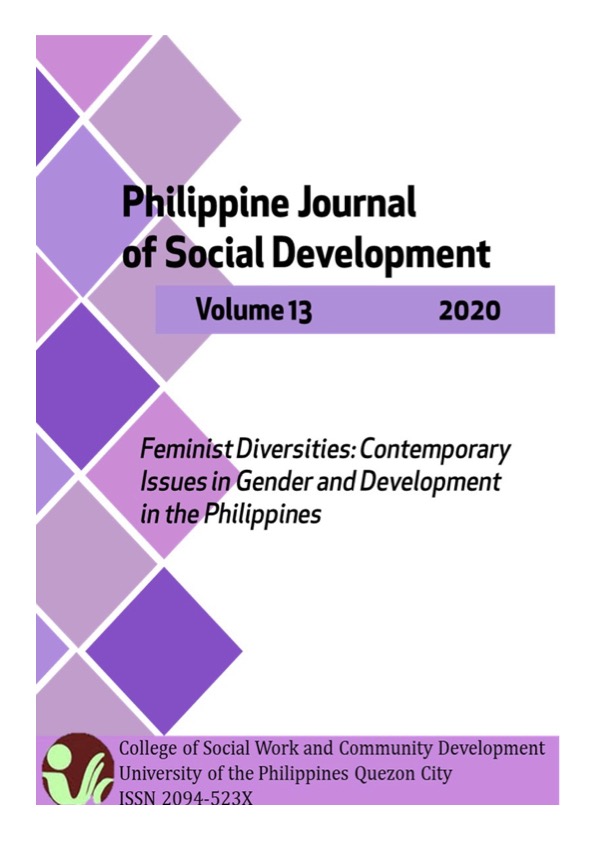Philippine Journal of Social Development Volume 13 2020
Foreword
Nathalie Lourdes Africa-Verceles
Notes on Contributors
The L Words – Lesbian and Labor: Physical and Social Health Impacts of Call Center Work on Lesbian Women in Quezon City, Philippines
Mylene De Guzman
Abstract The impacts of call center work have been the subject of several studies, but currently, there is paucity of research about lesbian women in the Business Process Outsourcing (BPO) industry. Call center work poses several physical and social health concerns and the worker’s lesbian identity poses yet another challenge in navigating this work environment. This descriptive study used a qualitative approach. Ten (10) lesbian call center workers gave their narratives through semi-structured in-depth interviews in more than a year of doing fieldwork in Eastwood, Quezon City, Philippines. Working in call centers has multiple detrimental effects to health. The participants of the study experienced physical health issues that include voice problems, sleeping problems, unhealthy eating habits, and unhealthy vices such as smoking. Call center work has also affected their social health due to the inflexible and highly variable shifting work schedule, and lesbian call center agents were subject to subtle forms of discrimination in the office. There is a need to look into the effects of call center work on lesbians, as they are inevitably subject to physical and social health impacts, and these impacts are compounded by different forms of discrimination in the workplace.
Keywords lesbian health, call center work, occupational health, discrimination, Philippines
Pushing the Boundaries of Motherhood and Pagkadalaga: Sexuality and Reproductive Freedom of Urban Poor Women and Volunteers of the Likhaan Center for Women’s Health
Sabrina Laya S. Gacad
Abstract Through the conduct of feminist research in urban poor communities, this study reveals pathways to reproductive freedom anchored on women expanding the meaning and performance of moral motherhood and pagkadalaga, supported by free and stigma-free reproductive health service delivery and education. The study elaborates on the multiple meanings of paglalandi, the only space in mainstream Filipino society that allows the open discussion of sexuality. The study makes the argument that women’s knowledge, life experiences, and aspirations around paglalandi, motherhood, and pagkadalaga, even as they are defined by patriarchy and limited by material conditions, are potent sites for eroding patriarchal and capitalist control of peoples’ bodies, identities, and desires.
Keywords sexuality, reproductive freedom, motherhood, pagkadalaga, paglalandi
The President’s Monologues: Duterte’s Rhetoric and Toxic Masculinities
Shebana Alqaseer
Abstract This study provides a preliminary analysis of Philippine President Rodrigo Duterte’s displays and projections of masculinity by collating and analyzing his public remarks during his electoral campaign and the first three years of his presidency with the use of textual analysis. Given his position in Philippine politics and his prominence in mass media, Duterte’s narratives, particularly towards gender and masculinity, call for thorough analysis. By examining Duterte’s remarks through the lens of masculinity studies and framing it in theorizing on “precarious manhood,” this study offers new insight and a fresh approach to decoding and understanding the context and underlying causes of his behavior – the results of which can, in turn, serve as a starting point for addressing its deeper origins and countering its harmful effects. Texts of Duterte’s speeches and remarks were collected from official archives, supplemented by news reports. These texts were then read and interpreted along three key areas in masculinity studies: heteronormativity and gender and sexual scripts; homophobia and gender policing; and toxic masculinity. From this preliminary textual analysis, what emerges is a brand of masculinity that hews close to orthodox, traditional, or macho masculinity, marked by regular descents into toxic masculinity – one that calls for further study not just because of the volume of Duterte’s remarks and the breadth of concepts in masculinity studies that can help decode them, but also because of this subject’s considerable implications on politics and culture in the Philippines, now and in the years to come.
Keywords: Duterte, textual analysis, masculinity studies
Problematizing Privatization: How Private Takeover of Local Water Districts Impacts Gender Mainstreaming
Atty. Allen L. Espino

